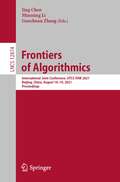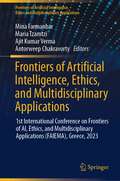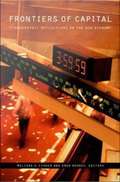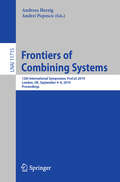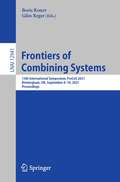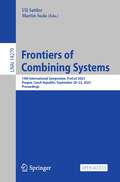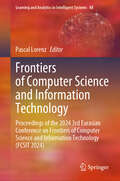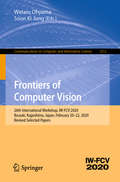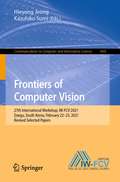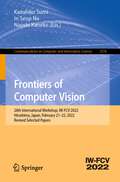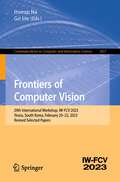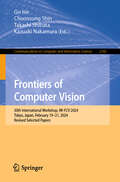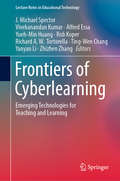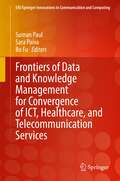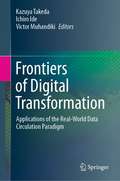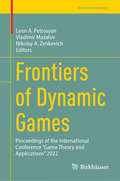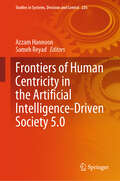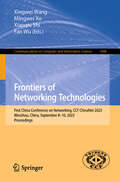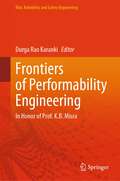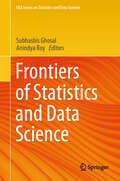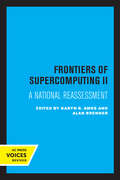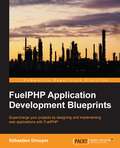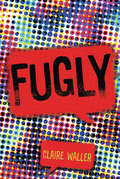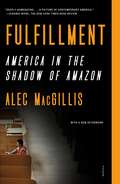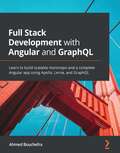- Table View
- List View
Frontiers of Algorithmics: International Joint Conference, IJTCS-FAW 2021, Beijing, China, August 16–19, 2021, Proceedings (Lecture Notes in Computer Science #12874)
by Jing Chen Minming Li Guochuan ZhangThis book constitutes the proceedings of the 15th International Workshop on Frontiers in Algorithmics, FAW 2021, held in conjunction with second International Joint Conference on Theoretical Computer Science (IJTCS 2021), as IJTCS-FAW 2021, in Beijing, China, in August 2021. The conference IJTCS-FAW 2021 was held in hybrid mode due to the COVID-19 pandemic. The 5 full papers presented in this volume were carefully reviewed and selected from 9 submissions. The joint conference provides a focused forum on Algorithmic Game Theory, Blockchain, Multi-agent Reinforcement Learning, Quantum Computation, Theory of Machine Learning, Machine Learning, Formal Method, Algorithm and Complexity, and EconCS.
Frontiers of Artificial Intelligence, Ethics, and Multidisciplinary Applications: 1st International Conference on Frontiers of AI, Ethics, and Multidisciplinary Applications (FAIEMA), Greece, 2023 (Frontiers of Artificial Intelligence, Ethics and Multidisciplinary Applications)
by Ajit Kumar Verma Antorweep Chakravorty Mina Farmanbar Maria TzamtziThis groundbreaking proceedings volume explores the integration of Artificial Intelligence (AI) across key domains—healthcare, finance, education, robotics, industrial and other engineering applications —unveiling its transformative potential and practical implications. With a multidisciplinary lens, it transcends technical aspects, fostering a comprehensive understanding while bridging theory and practice. Approaching the subject matter with depth, the book combines theoretical foundations with real-world case studies, empowering researchers, professionals, and enthusiasts with the knowledge and tools to effectively harness AI. Encompassing diverse AI topics—machine learning, natural language processing, computer vision, data analytics and supervisory control — the volume showcases state-of-the-art techniques propelling AI advancements. Structured into four parts: Part 1: Artificial Intelligence (AI), explores evolving deep neural networks, reinforcement learning, and explainable AI, providing a deep dive into the technical foundations of AI advancements. Part 2: Robotics and Control Systems, delves into the integration of AI in robotics and automatic control, addressing supervisory control, automated robotic movement coordination, anomaly detection, dynamic programming, and fault tolerance, offering insights into the evolving landscape of intelligent automation. Part 3: AI and Society, examines the societal impact of AI through chapters on ethical considerations, economic growth, environmental engagements, and hazard management, providing a holistic perspective on AI's role in shaping society. Part 4: PhD Symposium, presents the future of AI through cutting-edge research, covering legal and ethical dimensions, privacy considerations, and computationally efficient solutions, offering a glimpse into the next generation of AI advancements. Catering to a diverse audience—from industry leaders to students—the volume consolidates the expertise of renowned professionals, serving as a comprehensive resource for navigating the ever-evolving AI landscape. An essential reference for those staying at the forefront of AI developments.
Frontiers of Capital: Ethnographic Reflections on the New Economy
by Greg Downey Melissa S. FisherWith the NASDAQ having lost 70 percent of its value, the giddy, optimistic belief in perpetual growth that accompanied the economic boom of the 1990s had fizzled by 2002. Yet the advances in information and communication technology, management and production techniques, and global integration that spurred the "New Economy" of the 1990s had triggered profound and lasting changes. Frontiers of Capital brings together ethnographies exploring how cultural practices and social relations have been altered by the radical economic and technological innovations of the New Economy. The contributors, most of whom are anthropologists, investigate changes in the practices and interactions of futures traders, Chinese entrepreneurs, residents of French housing projects, women working on Wall Street, cable television programmers, and others. Some contributors highlight how expedited flows of information allow business professionals to develop new knowledge practices. They analyze dynamics ranging from the decision-making processes of the Federal Reserve Board to the legal maneuvering necessary to buttress a nascent Japanese market in over-the-counter derivatives. Others focus on the social consequences of globalization and new modes of communication, evaluating the introduction of new information technologies into African communities and the collaborative practices of open-source computer programmers. Together the essays suggest that social relations, rather than becoming less relevant in the high-tech age, have become more important than ever. This finding dovetails with the thinking of many corporations, which increasingly employ anthropologists to study and explain the "local" cultural practices of their own workers and consumers. Frontiers of Capital signals the wide-ranging role of anthropology in explaining the social and cultural contours of the New Economy. Contributors. Jean Comaroff, John L. Comaroff, Greg Downey, Melissa S. Fisher, Douglas R. Holmes, George E. Marcus, Siobhn O'Mahony, Aihwa Ong, Annelise Riles, Saskia Sassen, Paul A. Silverstein, AbdouMaliq Simone, Neil Smith, Caitlin Zaloom
Frontiers of Combining Systems: 12th International Symposium, FroCoS 2019, London, UK, September 4-6, 2019, Proceedings (Lecture Notes in Computer Science #11715)
by Andreas Herzig Andrei PopescuThis book constitutes the proceedings of the 12th International Symposium on Frontiers of Combining Systems, FroCoS 2019, held in London, UK, in September 2019, colocated with the 28th International Conference on Automated Reasoning with Analytic Tableaux and Related Methods, TABLEAUX 2019. The 20 papers presented were carefully reviewed and selected from 30 submissions. They present research on the development of techniques and methods for the combination and integration of formal systems, their modularization and analysis. The papers are organized in the following topical sections: automated theorem proving and model building, combinations of systems, constraint solving, description logics, interactive theorem proving, modal and epistemic logics, and rewriting and unification.
Frontiers of Combining Systems: 13th International Symposium, FroCoS 2021, Birmingham, UK, September 8–10, 2021, Proceedings (Lecture Notes in Computer Science #12941)
by Giles Reger Boris KonevThis book constitutes the refereed proceedings of the 13th International Symposium on Frontiers of Combining Systems, FroCoS 2021, held in Birmingham, UK, in September 2021.
Frontiers of Combining Systems: 14th International Symposium, FroCoS 2023, Prague, Czech Republic, September 20–22, 2023, Proceedings (Lecture Notes in Computer Science #14279)
by Uli Sattler Martin SudaThis book constitutes the refereed proceedings of the 14th International Symposium on Frontiers of Combining Systems, FroCoS 2023, held in Prague, Czech Republic, in September 2023. The symposium was co-located with the 32nd International Conference on Automated Reasoning with Analytic Tableaux and Related Methods, TABLEAUX 2023.The 14 papers presented were thorouhgly reviewed and selected from the 22 high-quality paper submissions. They are grouped in the volume according to the following topic classification: analysis of programs and equations; unification; decidable fragments; frameworks; higher-order theorem proving.This is an open access book.
Frontiers of Computer Science and Information Technology: Proceedings of the 2024 3rd Eurasian Conference on Frontiers of Computer Science and Information Technology (FCSIT 2024) (Learning and Analytics in Intelligent Systems #48)
by Pascal LorenzThis book presents a collection of papers from the 3rd Eurasian Conference on Frontiers of Computer Science and Information Technology, held in Barcelona, Spain, from September 20-22, 2024. It offers a comprehensive overview of the latest research in subareas including Artificial Intelligence, Human-Computer Interaction, Information engineering, Computing Modelling, Computer Vision. Information Systems, and Ubiquitous Computing, providing insights into the dynamic world of computer science. The book aims to address the challenge of integrating these diverse fields into intelligent systems, making them applicable across various industries. It serves as a valuable resource for professionals, researchers, and students seeking to understand the innovative approaches and emerging trends in the field.
Frontiers of Computer Vision: 26th International Workshop, IW-FCV 2020, Ibusuki, Kagoshima, Japan, February 20–22, 2020, Revised Selected Papers (Communications in Computer and Information Science #1212)
by Wataru Ohyama Soon Ki JungThis book constitutes refereed proceedings of the 26th International Workshop Frontiers of Computer Vision, IW-FCV 2020, held in Ibusuki, Kagoshima, Japan, in February 2020. The 27 full papers presented were thoroughly reviewed and selected from 68 submissions. The papers in the volume are organized according to the following topics: real-world applications; face, pose, and action recognition; object detection and tracking; inspection and diagnosis; camera, 3D and imaging.
Frontiers of Computer Vision: 27th International Workshop, IW-FCV 2021, Daegu, South Korea, February 22–23, 2021, Revised Selected Papers (Communications in Computer and Information Science #1405)
by Hieyong Jeong Kazuhiko SumiThis book constitutes refereed proceedings of the 27th International Workshop Frontiers of Computer Vision, IW-FCV 2021, held in Daegu, South Korea, in February 2021. The 17 full papers and 8 short papers presented were thoroughly reviewed and selected from 44 submissions. The papers in the volume are organized according to the following topics: real-world applications; segmentation / object tracking; recognition; human behaviour; algorithm / application.
Frontiers of Computer Vision: 28th International Workshop, IW-FCV 2022, Hiroshima, Japan, February 21–22, 2022, Revised Selected Papers (Communications in Computer and Information Science #1578)
by Kazuhiko Sumi In Seop Na Naoshi KanekoThis book constitutes refereed proceedings of the 28th International Workshop on Frontiers of Computer Vision, IW-FCV 2022, held in Hiroshima, Japan, in February 2022. Due to the COVID-19 pandemic the conference was held online.The 24 full papers presented in this volume were thoroughly reviewed and selected from 63 submissions. The papers are organized according to the following topics: camera, 3D, and imaging; learning algorithm; object detection/segmentation; recognition/generation.
Frontiers of Computer Vision: 29th International Workshop, IW-FCV 2023, Yeosu, South Korea, February 20–22, 2023, Revised Selected Papers (Communications in Computer and Information Science #1857)
by Inseop Na Go IrieThis book constitutes refereed proceedings of the 29th International Workshop on Frontiers of Computer Vision, IW-FCV 2023, held in Yeosu, South Korea in February 20–22, 2023. This workshop is an annual event that brings together researchers in the field of computer vision and artificial intelligence to share their research results. The workshop was started 29 years ago as a way to strengthen networking and share research results between Japanese and Korean researchers, and it has since grown in scope and influence, so from 2017, the workshop became an international event. The 13 full papers presented in this volume were thoroughly reviewed and selected from 72 submissions in 8 countries. The papers are dealing with the following topics:basic theories related to image processing, computer vision, image media, and human interface, as well as all research fields in applied fields such as autonomous vehicle driving, robot automation, and image content recognition. Recently, topics related to application of medical, bio, and entertainment field applying artificial intelligence , and more.
Frontiers of Computer Vision: 30th International Workshop, IW-FCV 2024, Tokyo, Japan, February 19–21, 2024, Revised Selected Papers (Communications in Computer and Information Science #2143)
by Go Irie Choonsung Shin Takashi Shibata Kazuaki NakamuraThis book constitutes the revised selected papers from the 30th International Workshop on Frontiers of Computer Vision, IW-FCV 2024, held in Tokyo, Japan, in February 19–21, 2024. IW-FCV 2024 is an annual workshop that brings together researchers in the field of computer vision and artificial intelligence to share their research results. This workshop was started 30 years ago as a way to strengthen networking and share research results between Japanese and Korean researchers. It has since grown in scope and influence and has become an international event since 2017. The 12 full papers, carefully reviewed and selected from 61 submissions, primarily focus on the fundamental theories, techniques, and algorithms related to computer vision and image signal processing, with particular emphasis on practical applications. These papers deal with the following topics: Fundamentals and Theory (e.g., image filtering / enhancement / restoration, color and illumination analysis, and image coding), Computer Vision and Image Analysis (e.g., shape from-X, object detection and tracking, and deep learning for computer vision), Applications (e.g., image/video search and retrieval, surveillance, AR/VR/MR/HR, and bio-medical image analysis), and Recognition and Learning (e.g., 2D/3D object recognition, face and gesture recognition, and human pose estimation).
Frontiers of Cyberlearning: Emerging Technologies For Teaching And Learning (Lecture Notes In Educational Technology Ser.)
by J. Michael Spector Rob Koper Yanyan Li Yueh-Min Huang Ting-Wen Chang Vivekanandan Kumar Alfred Essa Zhizhen Zhang Richard A. TortorellaThis book demonstrates teachers’ and learners’ experiences with big data in education; education and cloud computing; and new technologies for teacher support. It also discusses the advantages of using these frontier technologies in teaching and learning and predicts the future challenges. As such, it enables readers to better understand how technologies can improve learning and teaching experiences. It is intended for graduates and scholars in educational technology disciplines and anyone interested in the applications of frontier technologies in education.
Frontiers of Data and Knowledge Management for Convergence of ICT, Healthcare, and Telecommunication Services (EAI/Springer Innovations in Communication and Computing)
by Bo Fu Sara Paiva Suman PaulThis book provides a range of application areas of data and knowledge management and their solutions for the fields related to the convergence of information and communication technology (ICT), healthcare, and telecommunication services. The authors present approaches and case studies in future technological trends and challenges in the aforementioned fields. The book acts as a scholarly forum for researchers both in academia and industry.
Frontiers of Digital Transformation: Applications of the Real-World Data Circulation Paradigm
by Kazuya Takeda Ichiro Ide Victor MuhandikiProposing the concept of real-world data circulation (RWDC), this book presents various practical and industry-related studies in human, mechanical, and social data domains. RWDC is a new field of study, established by the information technology (IT) community.In the real world, the speed of data transmission between computers surpassed that of human communications long ago and has since expanded exponentially. As a result, the origin of the majority of data has become non-human, mechanical, or natural sources; in fact, humans are merely the source of a small part of the current data explosion. Such expanding data transmission does not simply consist of single source–destination pairs, but actually circulates over a complex network connecting numerous sources and destinations. Such circulation is an important aspect of the underlying systems. Based on this concept, in order to tame and control the massive amount of data originating from non-human sources, the authors have been considering the insertion of acquisition, analysis, and implementation processes in the flow of data circulation. This book introduces the outcome of the RWDC degree program organized at Nagoya University, Japan, collecting contributions from graduate students enrolled in the program from various research fields targeting diverse applications. Through examples of RWDC, the resulting creation of social value is illustrated. This book will be useful not only for those working on the topics discussed, but also to anyone who is interested in RWDC, digital transformation, and Industry 4.0.
Frontiers of Dynamic Games: Proceedings of the International Conference “Game Theory and Applications” 2022 (Trends in Mathematics)
by Leon A. Petrosyan Nikolay A. Zenkevich Vladimir MazalovThis book collects a selection of the articles presented at the virtual conference “Game Theory and Applications”, organized in St. Petersburg in the summer of 2022. The articles in this collection cover all the main applications of game theory, interpolating mathematical methods with economics, biology, sociology, mobile systems, and social networks. Scholars in the field will find this to be a valuable contribution.
Frontiers of Human Centricity in the Artificial Intelligence-Driven Society 5.0 (Studies in Systems, Decision and Control #226)
by Azzam Hannoon Sameh ReyadAccording to Serpa (in MDPI encyclopedia) [3], Society 5.0 can be realized as a concept and a guide for social development, with a profound impact on current societal structures in multiple levels. Society 5.0 achieves advanced convergence between cyberspace and physical space, enabling AI-based on big data and robots to perform or support as an agent the work and adjustments that humans have done up to now. Deguchi et al., [4] define Society 5.0 as a highly intelligent society based on generation, processing, exchange of data, and more specifically knowledge, through the connection of the physical environment with the cyberspace. Achieving Society 5.0 with these attributes would enable the world to realize economic development while solving key social problems. It would additionally contribute to achieving the SDGs established by the United Nations. Despite the differences in formulation of the names of these periods and societies, it is obvious that each of them became a basis for step like growth in developed society; at, specific time periods, scale, character and depth of these changes are different in different countries. Consequently, to address the aims of the book, it seeks exploratory, empirical, interpretive, and theoretical research built on either primary or secondary data. The approaches suggested are not exhaustive and can be extended upon by the researchers. In addition, the book will contribute towards the UN’s sustainable development goals. In support of UN’s efforts towards a more digital economy, this book aims to debate and discuss the history, genesis, future, opportunities, and challenges of transitioning to Society 5.0. and provides a holistic perspective on a variety of topics special topics which contribute towards the optimal attainment of the SDGs, particularly in terms of socialdimensions. Finally, this book provides a platform for researchers, academics, and professionals to the transition and technological enablers of industrial revolutions through empirical or exploratory studies that use a variety of innovative approaches. The target audience of the book includes researchers and scholars who will find in its comprehensive knowledge about industry 4, industry 5, society 5 and its contribution to economic growth and sustainable development goals (SDGs). Furthermore, the book’s secondary target audience are teachers, managers, strategists, professionals, governments, and policymakers.
Frontiers of Networking Technologies: First China Conference on Networking, CCF ChinaNet 2023, Wenzhou, China, September 8–10, 2023, Proceedings (Communications in Computer and Information Science #1988)
by Fan Wu Mingwei Xu Xingwei Wang Xiaoqiu ShiThis book constitutes the proceedings of the First China Conference on Networking, CCF ChinaNet 2023, which took place in Wenzhou, China, during September 8-10, 2023. The 13 full papers included in the book were carefully reviewed and selected from 61 submissions. They deal with networking technologies such as cloud computing; mobile and network security; computer engineering and networks; etc. The theme of this year's conference was “Integrating Industry, Search, and Innovation, Serving the Networking Powerhouse”.
Frontiers of Performability Engineering: In Honor of Prof. K.B. Misra (Risk, Reliability and Safety Engineering)
by Durga Rao KarankiThis book presents recent advances in performability analysis methods and their applications in different fields. It covers various aspects of performability such as quality, reliability, maintainability, availability, safety, security, and sustainability that are essential in complex engineering systems such as electrical grids, chemical plants, naval defense systems, structures, nuclear reactors, railways, etc. This book is a collection of research works contributed by the former students of Professor KB Mishra who is a renowned researcher in reliability engineering. This book is useful for the researchers and professionals working in the area of performability engineering.
Frontiers of Statistics and Data Science (IISA Series on Statistics and Data Science)
by Subhashis Ghosal Anindya RoyThis book addresses a diverse set of topics of contemporary interest in statistics and data science such as biostatistics and machine learning. Each chapter provides an overview of the topic under discussion, so that any reader with an understanding of graduate-level statistics, but not necessarily with a prior background on the topic should be able to get a summary of developments in the field. These chapters serve as basic introductory references for new researchers in these fields, as well as the basis of teaching a course on the topic, or with a part of the course on topics of precision medicine, deep learning, high-dimensional central limit theorems, multivariate rank testing, R programming for statistics, Bayesian nonparametrics, large deviation asymptotics, spatio-temporal modeling of Covid-19, statistical network models, hidden Markov models, statistical record linkage analysis. The edited volume will be most useful for graduate students looking for an overview of any of the covered topics for their research and for instructors for developing certain courses by including any of the topics as part of the course. Students enrolled in a course covering any of the included topics can also benefit from these chapters.
Frontiers of Supercomputing II: A National Reassessment (Los Alamos Series in Basic and Applied Sciences #13)
by Karyn R. Ames Alan BrennerThis uniquely comprehensive book brings together the vast amount of technical, economic, and political information and the analyses of supercomputing that have hitherto been buried in the frequently inaccessible "gray literature." Seventy-nine distinguished participants in the second Frontiers of Supercomputing conference offer perceptive and often controversial views on the emerging computing environment in the United States. This title is part of UC Press's Voices Revived program, which commemorates University of California Press’s mission to seek out and cultivate the brightest minds and give them voice, reach, and impact. Drawing on a backlist dating to 1893, Voices Revived makes high-quality, peer-reviewed scholarship accessible once again using print-on-demand technology. This title was originally published in 1994.
FuelPHP Application Development Blueprints
by Sebastien DrouyerThis book is for intermediary to seasoned web developers who want to learn how to use the FuelPHP framework and build complex projects using it. You should be familiar with PHP, HTML, CSS, and JavaScript, but no prior knowledge about MVC frameworks is required.
Fugly
by Claire WallerA wrenchingly honest, thought-provoking exploration of a girl judged and dismissed by society who must break the cycle of shaming that traps her in her real life and comforts her in her online one. In real life, eighteen-year-old Beth is overweight, shy, and geeky. She's been bullied all her life, and her only refuge is food. Online, though, she's a vicious troll who targets the beautiful, vain, oversharing It Girls of the internet. When she meets Tori, a fellow troll, she becomes her online girlfriend-slash-partner-in-crime. But then Tori picks a target who's a little too close to home for Beth. Unsettled, Beth decides to quit their online bullying partnership. The only problem is, Tori is not willing to let her go.
Fulfillment: Winning and Losing in One-Click America
by Alec MacGillisA New York Times Book Review Editors' Choice"A grounded and expansive examination of the American economic divide . . . It takes a skillful journalist to weave data and anecdotes together so effectively." —Carolyn Kellogg, Los Angeles TimesAn award-winning journalist investigates Amazon’s impact on the wealth and poverty of towns and cities across the United States.In 1937, the famed writer and activist Upton Sinclair published a novel bearing the subtitle A Story of Ford-America. He blasted the callousness of a company worth “a billion dollars” that underpaid its workers while forcing them to engage in repetitive and sometimes dangerous assembly line labor. Eighty-three years later, the market capitalization of Amazon.com has exceeded one trillion dollars, while the value of the Ford Motor Company hovers around thirty billion. We have, it seems, entered the age of one-click America—and as the coronavirus makes Americans more dependent on online shopping, its sway will only intensify.Alec MacGillis’s Fulfillment is not another inside account or exposé of our most conspicuously dominant company. Rather, it is a literary investigation of the America that falls within that company’s growing shadow. As MacGillis shows, Amazon’s sprawling network of delivery hubs, data centers, and corporate campuses epitomizes a land where winner and loser cities and regions are drifting steadily apart, the civic fabric is unraveling, and work has become increasingly rudimentary and isolated.Ranging across the country, MacGillis tells the stories of those who’ve thrived and struggled to thrive in this rapidly changing environment. In Seattle, high-paid workers in new office towers displace a historic black neighborhood. In suburban Virginia, homeowners try to protect their neighborhood from the environmental impact of a new data center. Meanwhile, in El Paso, small office supply firms seek to weather Amazon’s takeover of government procurement, and in Baltimore a warehouse supplants a fabled steel plant. Fulfillment also shows how Amazon has become a force in Washington, D.C., ushering readers through a revolving door for lobbyists and government contractors and into CEO Jeff Bezos’s lavish Kalorama mansion.With empathy and breadth, MacGillis demonstrates the hidden human costs of the other inequality—not the growing gap between rich and poor, but the gap between the country’s winning and losing regions. The result is an intimate account of contemporary capitalism: its drive to innovate, its dark, pitiless magic, its remaking of America with every click.
Full Stack Development with Angular and GraphQL: Learn to build scalable monorepo and a complete Angular app using Apollo, Lerna, and GraphQL
by Ahmed BouchefraUse tools such as Lerna and GraphQL Code Generator to leverage recent features like NPM Workspaces for configuring a mono-repo project and Apollo Client's reactive variables to easily manage the local state of your appKey FeaturesUse Angular modules and components to build apps that you can easily scale and maintain in the futureDevelop a GraphQL API for a small social network app using Node.js, Express, and Apollo ServerUse Apollo Client to integrate Angular with a GraphQL server and manage your application's local stateBook DescriptionAngular is one of the most popular JavaScript frameworks in modern web app development allowing developers to not only build apps and reuse the code but also develop apps for any deployment target. For web, mobile web, native mobile, and native desktop, GraphQL is the modern and REST alternative for querying web APIs. Using Angular, TypeScript and GraphQL will give you a future-proof and scalable stack you can start building apps around. This book shows you how to build apps using cutting-edge technologies. You'll learn how to solve common web development problems with GraphQL and Apollo, such as database access, authentication, and image uploads. The book starts by introducing you to building full stack apps with Angular and GraphQL. Next, you'll learn how to create a monorepo project with Lerna and NPM Workspaces and configure a Node.js app to use GraphQL with Express and Apollo Server. You'll also understand the basics of Angular architecture and routing. Later, the book demonstrates how to build a professionally-looking UI with Angular Material, use Apollo Client to interface with the server to get data from the built GraphQL API. You'll learn about Apollo Client's type and field policies, and various fetching policies. In addition to this, you'll learn about local state management and reactive variables with Apollo Client and how to generate TypeScript types and even Angular Apollo services for your GraphQL schema and queries using GraphQL Code Generator to implement a scalable codebase. By the end of this book, you'll have the skills you need to be able to build your own full stack application.What you will learnCreate a monorepo project with Lerna and NPM workspacesAdd realtime support with GraphQL subscriptionsBuild a frontend with a modular architecture and Material Design UI components to consume the GraphQL APIUse GraphQL Code Generator to generate types and code for a type-safe and scalable code baseCreate Angular modules and smart and dumb components and share data between themUse Apollo Client features such as client-side queries and reactive variables for local state managementWho this book is forThis Angular GraphQL book is for Angular developers who want to learn how to use GraphQL and Apollo with Angular to build full-stack applications. This book does not assume prior knowledge of full-stack development with Angular and GraphQL.
